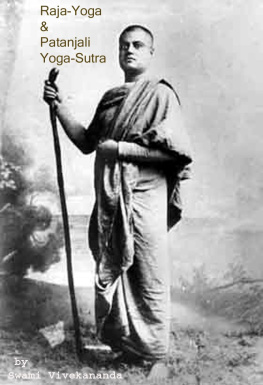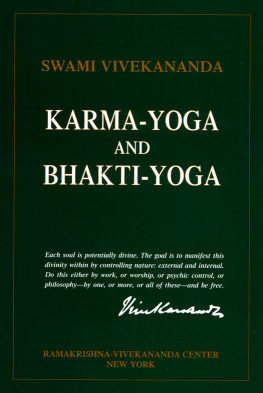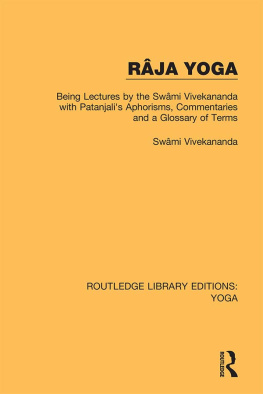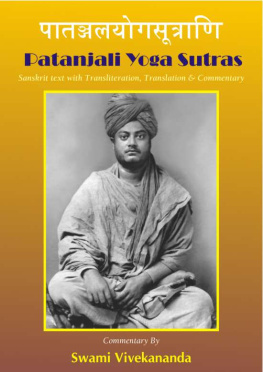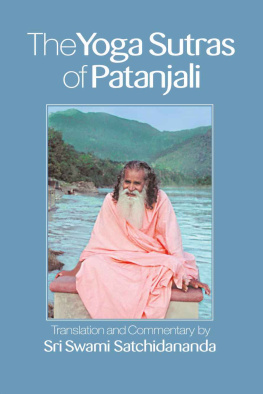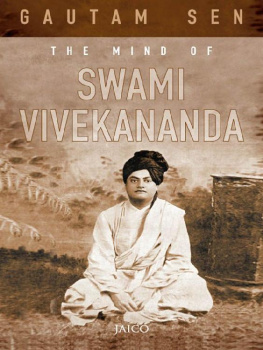Swami Vivekananda - Raja-Yoga & Patanjali Yoga-Sutra by Swami Vivekananda
Here you can read online Swami Vivekananda - Raja-Yoga & Patanjali Yoga-Sutra by Swami Vivekananda full text of the book (entire story) in english for free. Download pdf and epub, get meaning, cover and reviews about this ebook. year: 2012, genre: Religion. Description of the work, (preface) as well as reviews are available. Best literature library LitArk.com created for fans of good reading and offers a wide selection of genres:
Romance novel
Science fiction
Adventure
Detective
Science
History
Home and family
Prose
Art
Politics
Computer
Non-fiction
Religion
Business
Children
Humor
Choose a favorite category and find really read worthwhile books. Enjoy immersion in the world of imagination, feel the emotions of the characters or learn something new for yourself, make an fascinating discovery.
- Book:Raja-Yoga & Patanjali Yoga-Sutra by Swami Vivekananda
- Author:
- Genre:
- Year:2012
- Rating:5 / 5
- Favourites:Add to favourites
- Your mark:
- 100
- 1
- 2
- 3
- 4
- 5
Raja-Yoga & Patanjali Yoga-Sutra by Swami Vivekananda: summary, description and annotation
We offer to read an annotation, description, summary or preface (depends on what the author of the book "Raja-Yoga & Patanjali Yoga-Sutra by Swami Vivekananda" wrote himself). If you haven't found the necessary information about the book — write in the comments, we will try to find it.
Raja-Yoga & Patanjali Yoga-Sutra by Swami Vivekananda — read online for free the complete book (whole text) full work
Below is the text of the book, divided by pages. System saving the place of the last page read, allows you to conveniently read the book "Raja-Yoga & Patanjali Yoga-Sutra by Swami Vivekananda" online for free, without having to search again every time where you left off. Put a bookmark, and you can go to the page where you finished reading at any time.
Font size:
Interval:
Bookmark:
RAJA-YOGA
&
PATANJALI YOGA-SUTRA
By
Swami Vivekananda
RAJA-YOGA
Sincethe dawn of history, various extraordinary phenomena have been recorded ashappening amongst human beings. Witnesses are not wanting in modern times toattest to the fact of such events, even in societies living under the fullblaze of modern science. The vast mass of such evidence is unreliable, ascoming from ignorant, superstitious, or fraudulent persons. In many instancesthe so - called miracles are imitations. But what do they imitate? It is notthe sign of a candid and scientific mind to throw overboard anything withoutproper investigation. Surface scientists, unable to explain the variousextraordinary mental phenomena, strive to ignore their very existence. Theyare, therefore, more culpable than those who think that their prayers areanswered by a being, or beings, above the clouds, or than those who believethat their petitions will make such beings change the course of the universe.The latter have the excuse of ignorance, or at least of a defective system ofeducation, which has taught them dependence upon such beings, a dependencewhich has become a part of their degenerate nature. The former have no suchexcuse.
Forthousands of years such phenomena have been studied, investigated, and generalized,the whole ground of the religious faculties of man has been analyzed, and thepractical result is the science of Raja-Yoga. Raja-Yoga does not, after theunpardonable manner of some modern scientists, deny the existence of factswhich are difficult to explain; on the other hand, it gently yet in nouncertain terms tells the superstitious that miracles, and answers to prayers,and powers of faith, though true as facts, are not rendered comprehensiblethrough the superstitious explanation of attributing them to the agency of abeing, or beings, above the clouds. It declares that each man is only a conduitfor the infinite ocean of knowledge and power that lies behind mankind. Itteaches that desires and wants are in man, that the power of supply is also inman; and that wherever and whenever a desire, a want, a prayer has been fulfilled;it was out of this infinite magazine that the supply came, and not from anysupernatural being. The idea of supernatural beings may rouse to a certainextent the power of action in man, but it also brings spiritual decay. Itbrings dependence; it brings fear; it brings superstition. It degenerates intoa horrible belief in the natural weakness of man. There is no supernatural,says the Yogi, but there are in nature gross manifestations and subtlemanifestations. The subtle are the causes, the gross the effects. The gross canbe easily perceived by the senses; not so the subtle. The practice of Raja -yoga will lead to the acquisition of the more subtle perceptions.
All the orthodox systems of Indiaphilosophy have one goal in view, the liberation of the soul throughperfection. The method is by Yoga. The word Yoga covers an immense ground, butboth the Sankhya and the Vedanta Schools point to Yoga in some form or other. Thesubject of the present book is that form of Yoga known as Raja-Yoga. Theaphorisms of Patanjali are the highest authority on Raja-Yoga, and form itstextbook. The other philosophers, though occasionally differing from Patanjaliin some philosophical points, have, as a rule, acceded to his method ofpractice a decided consent. The first part of this book comprises severallectures to classes delivered by the present writer in New York. The secondpart is a rather free translation of the aphorisms (Sutras) of Patanjali, witha running commentary. Effort has been made to avoid technicalities as far aspossible, and to keep to the free and easy style of conversation. In the firstpart some simple and specific directions are given for the student who wants topractice, but all such are especially and earnestly reminded that, with fewexceptions, Yoga can only be safely learnt by direct contact with a teacher. Ifthese conversations succeed in awakening a desire for further information onthe subject, the teacher will not be wanting.
Thesystem of Patanjali is based upon the system of the Sankhya, the points ofdifference being very few. The two most important differences are, first, thatPatanjali admits a Personal God in the form of a first teacher, while the onlyGod the Sankhya admit is a nearly perfected being, temporarily in charge of acycle of creation. Second, the Yogis hold the mind to be equally all -pervading with the soul, or Purusha, and the Sankhya do not.
TheAuthor
Eachsoul is potentially divine. The goal is to manifest this Divinity within bycontrolling nature, external and internal. Do this either by work, or worship,or psychic control, or philosophy - by one, or more, or all of these -- and befree. This is the whole of religion. Doctrines, or dogmas, or rituals, orbooks, or temples, or forms, are but secondary details.
All ourknowledge is based upon experience. What we call inferential knowledge, inwhich we go from the less to the more general, or from the general to theparticular, have experience as its basis. In what are called the exactsciences, people easily find the truth, because it appeals to the particularexperiences of every human being. The scientist does not tell you to believe inanything, but he has certain results which come from his own experiences, andreasoning on them when he asks us to believe in his conclusions, he appeals tosome universal experience of humanity. In every exact science there is a basiswhich is common to all humanity, so that we can at once see the truth or thefallacy of the conclusions drawn therefore. Now, the question is: Has religionany such basis or not? I shall have to answer the question both in theaffirmative and in the negative.
Religion,as it is generally taught all over the world, is said to be based upon faithand belief, and, in most cases, consists only of different sets of theories,and that is the reason why we find all religions quarrelling with one another.These theories, again, are based upon belief. One man says there is a great beingsitting above the clouds and governing the whole universe, and he asks me tobelieve that solely on the authority of his assertion. In the same way, I mayhave my own ideas, which I am asking others to believe, and if they ask areason, I cannot give them any. This is why religion and metaphysicalphilosophy have a bad name nowadays. Every educated man seems to say, "Oh,these religions are only bundles of theories without any standard to judge themby, each man preaching his own pet ideas." Nevertheless, there is a basisof universal belief in religion, governing all the different theories and allthe varying ideas of different sects in different countries. Going to theirbasis we find that they also are based upon universal experiences.
In thefirst place, if you analyze all the various religions of the world, you willfind that these are divided into two classes, those with a book and thosewithout a book. Those with a book are the strongest, and have the largestnumber of followers. Those without books have mostly died out, and the few newones have very small followings. Yet, in all of them we find one consensus ofopinion, that the truths they teach are the results of the experiences ofparticular persons. The Christian asks you to believe in his religion, tobelieve in Christ and to believe in him as the incarnation of God, to believein a God, in a soul, and in a better state of that soul. If I ask him forreason, he says he believes in them. But if you go to the fountain - head ofChristianity, you will find that it is based upon experience. Christ said hesaw God; the disciples said they felt God; and so forth. Similarly, inBuddhism, it is Buddha's experience. He experienced certain truths, saw them,came in contact with them, and preached them to the world. Sowith the Hindus. In their books the writers, who are called Rishis, orsages, declare they experienced certain truths, and these they preach. Thus itis clear that all the religions of the world have been built upon that oneuniversal and adamantine foundation of all our knowledge -- direct experience.The teachers all saw God; they all saw their own souls, they saw their future,they saw their eternity, and what they saw they preached. Only there is thisdifference that by most of these religions especially in modern times, apeculiar claim is made, namely, that these experiences are impossible at the presentday; they were only possible with a few men, who were the first founders of thereligions that subsequently bore their names. At the present time theseexperiences have become obsolete, and, therefore, we have now to take religionon belief. This I entirely deny. If there has been one experience in this worldin any particular branch of knowledge, it absolutely follows that thatexperience has been possible millions of times before, and will be repeatedeternally. Uniformity is the rigorous law of nature; what once happened canhappen always. The teachers of the science of Yoga, therefore, declare thatreligion is not only based upon the experience of ancient times, but that noman can be religious until he has the same perceptions himself. Yoga is thescience which teaches us how to get these perceptions. It is not much use totalk about religion until one has felt it. Why is there so much disturbance, so much fighting and quarrelling in the name of God?There has been more bloodshed in the name of God than for any other cause,because people never went to the fountain - head; they were content only togive a mental assent to the customs of their forefathers, and wanted others todo the same. What right has a man to say he has a soul if he does not feel it, or that there is a God if he does not see Him? If thereis a God we must see Him, if there is a soul we must perceive it; otherwise itis better not to believe. It is better to be an outspoken atheist than ahypocrite. The modern idea, on the one hand, with the "learned" isthat religion and metaphysics and all search after a Supreme Being are futile;on the other hand, with the semi - educated, the idea seems to be that thesethings really have no basis; their only value consists in the fact that theyfurnish strong motive powers for doing good to the world. If men believe in aGod, they may become good, and moral, and so make good citizens. We cannotblame them for holding such ideas, seeing that all, but before we have donethat, we are not rational in denying the truth of their assertions. So we mustwork faithfully, using the prescribed methods, and light will come.
Font size:
Interval:
Bookmark:
Similar books «Raja-Yoga & Patanjali Yoga-Sutra by Swami Vivekananda»
Look at similar books to Raja-Yoga & Patanjali Yoga-Sutra by Swami Vivekananda. We have selected literature similar in name and meaning in the hope of providing readers with more options to find new, interesting, not yet read works.
Discussion, reviews of the book Raja-Yoga & Patanjali Yoga-Sutra by Swami Vivekananda and just readers' own opinions. Leave your comments, write what you think about the work, its meaning or the main characters. Specify what exactly you liked and what you didn't like, and why you think so.

